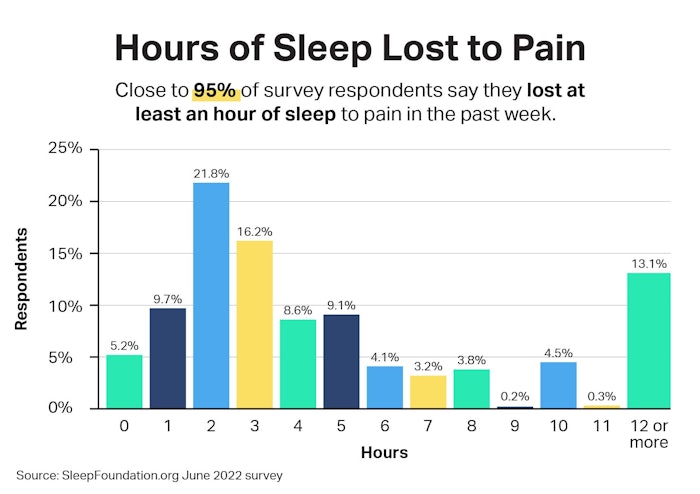
According to a Sleep Foundation June 2022 survey of 1,250 US adults, 94.8% reported that they have lost at least an hour of sleep to pain in total in the past week. A majority (85.1%) also said that the pain costs them at least two hours of sleep each night. This nightly pain is being labeled as "painsomnia," or insomnia from chronic pain.
Related: Good Sleep Linked to Heart Health
Many adults experience chronic pain, and The Centers for Disease Control and Prevention have noted a higher prevalence among women. “Chronic pain and insomnia go hand in hand, unless the pain is well managed,” says Dr. Medhat Mikhael, pain management specialist and medical director of the Spine Health Center at Memorial Care Orange Coast Medical Center.
Pain can also impact sleep quality, particularly by increasing latency, or the time it takes to fall asleep. According to the Sleep Foundation survey, 54.4% of adults said that pain kept them from falling asleep. The connection between sleep problems and pain is bidirectional as well, which means that pain causes insomnia, and insomnia can cause further pain.
The type of pain that is keeping people awake includes:
- Back pain (56.2%)
- Neck pain (41.3%)
- Head pain (32.3%)
- Knee pain (29.4%)
Related: 5 Tips for Creating Sleep Wellness Programming
Roughly half of the surveyed adults sought care for their pain from a healthcare professional, and 69.8% reported taking some sort of medication for their pain. Of those who had lost sleep due to pain, 55.8% have taken sleep aids in the past month, with melatonin as the most popular option. Survey participants also report that they attend support groups, primarily concentrated on social media, to address their pain and painsomnia.
The connection between spa and sleep presents an opportunity for spas to enhance their treatment offerings and address specific client needs. Spa pros can advise guests that pain relief treatments offered could improve their sleep.
Adding pain relief treatments into the spa's sleep programming could help guests find the underlying reasons for sleep issues. Some treatments could combine sleep and pain relief, like a sleep-promoting massage.
The food and beverage menus are another opportunity for spas to promote good sleep, as some fruits are not only healthy but could improve sleep.











